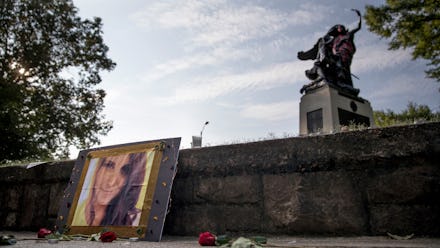Charlottesville made me — and reminds me why every young adult should step up in politics

Even in these politically dark times, we have to remember that there are victories to be won and reasons to keep fighting. I began my activism for greater equality in Charlottesville, which, after the events of this weekend, is synonymous to some people with white supremacist terror.
But that’s not my Charlottesville, the town that gave me, a teenage black girl from an African immigrant family, my political identity and motivated me to get involved. I was raised in the Richmond area, but Charlottesville is the place that laid the foundation to what my life is now — it is not just the place where I attended college, but also where I became an activist and a writer, where I met my husband, where we later married and where I worked on my first political campaign.
But when I first came to University of Virginia (UVA) in Charlottesville, I never thought about being politically engaged: Political discussion was something that happened at my table on occasion but, when I watched the news with my parents, I rarely saw anyone who looked like me discussing American politics. There were black elected officials — including Jesse Jackson — who had run for president when I was in diapers, but none had had the prominence that many do now. In short, nothing and no one resonated with me enough to be political engaged. Then the 2000 election happened, followed by 9/11, the Afghanistan war and the Iraq war — both of which sent my generation into harm’s way — and George W. Bush’s administration began rolling back the reproductive and health-care rights of women just like me and my friends.
Everything began to change for me.
Charlottesville was and is one of those rare college towns that is more liberal than the student body at UVA — which was perfect for budding liberals like myself who were slowly becoming politically active. And, in my years at UVA during the Bush administration, I slowly became engaged. The university had a philosophy of student self-governance that encouraged students to start and run their own organizations without faculty advisors hovering, allowing for the great incubation of self-determined student activism.
And, whether it was marching through the streets of town for a Take Back the Night March, a coordinated class walk-out, or another rally against the Iraq war, there was always something to do and many opportunities to engage with the community outside of the university walls. It was in this small Virginia town that I learned how to be an ally and supporter of my LGBT friends, and where I found the courage to show up and protest when issues of race discrimination flared up at the school. I even wrote for my school newspaper on many issues confronting students including race, gender, immigration and sexual orientation to name a few.
I soon realized that, while all of my protesting was good in (and the product of) a democratic society, I needed to do more: In a country in which we not only have regular elections but can also actually choose who we elect, I needed to get involved in electoral politics.
The thing was that I am an activist at heart, who is much more comfortable in a pair of jeans and a T-shirt. And the guys at UVA interested in politics as a profession or running for office always wore some khaki/polo or dress shirt/bowtie combination. I didn’t think I’d fit in.
But I realized that being in politics isn’t about fitting in: It’s about taking my seat at the table of democracy and changing it for the better. That, in part, led me to start a career working on political campaigns and to eventually run to be president of the Young Democrats of America (YDA).
And, in 2013, I became the first African-American and fifth woman to serve as president of YDA in its 81 years of existence. It’s that experience that changed how folks perceived and listened to me, and has led to other opportunities to make a difference on important issues.
Still, it’s hard for anyone today — even me — to feel like your voice matters, especially as a person of color after the election of President Donald Trump. What hope we might have had for a changing, more tolerant America in the election of Barack Obama was repudiated by Trump (who not only questioned Obama’s citizenship, and therefore right to be president, but who ran a presidential campaign steeped in white nationalist sentiment).
And now, the events of this past weekend in the very town that contributed to my political awakening, are devastating to those of us, especially progressive minded people who have called Charlottesville home at one point. There are still people who want nothing more than to silence our voices and even snuff out our lives, because of who we are and that we represent a changing America, that they do not want.
This time is difficult. I’m sure that many of you want to do nothing more than curl up in a fetal position and protect ourselves. But we can’t allow the kind of monsters who temporarily turned Charlottesville into a place of terror to hold permanent sway over the American political discourse. Now emboldened in the Trump era, this is not the last attempt these white supremacists will make. The more of us who step up to lead and organize, to become more engaged despite problems that — after the weekend’s violence — seem insurmountable, the more America will live up to its founding ideal: that all of us are created equal.